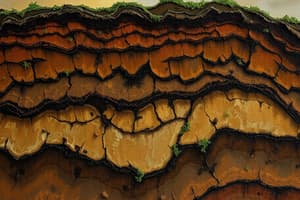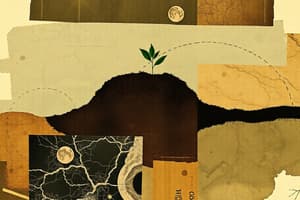Podcast
Questions and Answers
Which clay mineral is characterized as a montmorillonite clay?
Which clay mineral is characterized as a montmorillonite clay?
- Bentonite (correct)
- Halloysite
- Illite
- Kaolinite
What is the structural configuration of most clay minerals?
What is the structural configuration of most clay minerals?
- 1:2 clay mineral
- 1:1 clay mineral
- 3:1 clay mineral
- 2:1 clay mineral (correct)
Which property of clay minerals helps in ion exchange?
Which property of clay minerals helps in ion exchange?
- Hydrophobicity
- Thermal conductivity
- Isomorphous substitution (correct)
- Hydrophilicity
What transformation occurs when Halloysite is air dried?
What transformation occurs when Halloysite is air dried?
In which type of soil is Si+4 commonly replaced by Al+3?
In which type of soil is Si+4 commonly replaced by Al+3?
Which clay mineral is associated with making chinaware?
Which clay mineral is associated with making chinaware?
What type of bonding is primarily featured in clay minerals?
What type of bonding is primarily featured in clay minerals?
Which characteristic of clay minerals can be indicative of their suitability for various applications?
Which characteristic of clay minerals can be indicative of their suitability for various applications?
What does Cation Exchange Capacity refer to in clay minerals?
What does Cation Exchange Capacity refer to in clay minerals?
Which clay mineral is characterized by a 2:1 structure?
Which clay mineral is characterized by a 2:1 structure?
In terms of cation exchange capacity, which factor does it depend on?
In terms of cation exchange capacity, which factor does it depend on?
Which clay mineral generally has the highest cation exchange capacity?
Which clay mineral generally has the highest cation exchange capacity?
What is indicated by the term '2:1 clay mineral structure'?
What is indicated by the term '2:1 clay mineral structure'?
What effect does particle size have on cation exchange capacity?
What effect does particle size have on cation exchange capacity?
What is a key characteristic of Montmorillonite compared to other clay minerals?
What is a key characteristic of Montmorillonite compared to other clay minerals?
Which of the following statements about Kaolinite is accurate?
Which of the following statements about Kaolinite is accurate?
What is the primary composition of soil?
What is the primary composition of soil?
Who is recognized as the father of Soil Mechanics?
Who is recognized as the father of Soil Mechanics?
What type of soil is primarily deposited by rivers?
What type of soil is primarily deposited by rivers?
What process is represented by isomorphic substitution in soil?
What process is represented by isomorphic substitution in soil?
Which classification indicates a highly plastic inorganic clay?
Which classification indicates a highly plastic inorganic clay?
Which type of soil is created by glacial activity?
Which type of soil is created by glacial activity?
Loess is classified as which type of soil?
Loess is classified as which type of soil?
How is fine-grained soil classified according to the Indian standard?
How is fine-grained soil classified according to the Indian standard?
Flashcards are hidden until you start studying
Study Notes
Origin of Soils
- Soil is created from the disintegration of rocks.
- Dr. Karl Terzaghi is considered the father of Soil Mechanics, coining the term in 1925.
Geological Cycle
- The geological cycle consists of several phases, including transportation and deposition.
- Transportation refers to the movement of soil particles by various agents, such as rivers, wind, and ice.
- Deposition is the process by which transported soil particles settle down and accumulate.
Soil Types Based on Deposition
- Alluvial soil: Deposited by rivers.
- Aeolian soil: Deposited by wind.
- Glacial soil: Deposited by ice.
- Loess is a type of aeolian soil.
Common Clay Minerals
- Kaolinite:
- A 1:1 clay mineral.
- Has minimal isomorphic substitution.
- Used in the manufacturing of chinaware.
- Halloysite, when air-dried, transforms into Kaolinite.
- Montmorillonite:
- A 2:1 clay mineral.
- High isomorphic substitution.
- Found in Black Cotton soil.
- Commonly referred to as Bentonite.
- Illite:
- A 2:1 clay mineral.
- Significant isomorphic substitution.
- Ionic bonding is present.
Properties of Clay Minerals
- The size, grain structure, and mineral structure of a clay mineral affect its properties, such as dry strength, base exchange capacity, and activity.
- Base exchange capacity is the ability of a clay particle to absorb ions on its surface or edge.
- Activity is a measure of a clay's swelling potential.
Clay Mineral Properties Comparison
- Kaolinite has the lowest values for dry strength, base exchange capacity, and activity.
- Montmorillonite has the highest values for dry strength, base exchange capacity, and activity.
- Illite has intermediate values for dry strength, base exchange capacity, and activity.
Isomorphic Substitution
- Isomorphic substitution is the substitution of a metallic ion with another of lower valency but similar physical size.
- In montmorillonite, Si+4 is frequently replaced by Al+3.
- The replacement of metallic ions through isomorphic substitution is common in residual soil coming from volcanic ash.
Studying That Suits You
Use AI to generate personalized quizzes and flashcards to suit your learning preferences.




